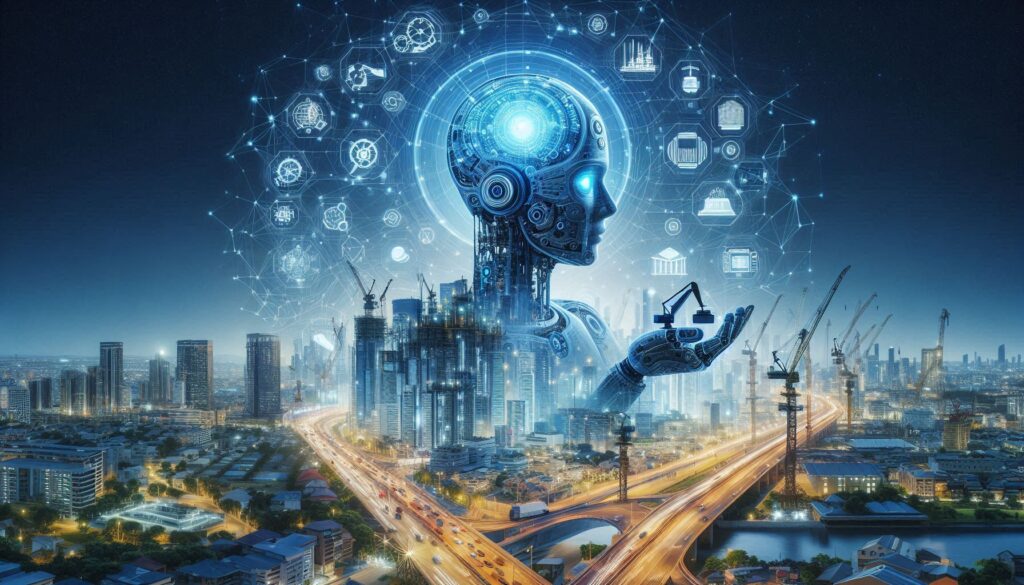The integration of Artificial Intelligence (AI) in civil engineering

Artificial Intelligence (AI) is transforming numerous industries, and civil engineering is no exception. The integration of AI in civil engineering is revolutionizing traditional practices, enhancing efficiency, and paving the way for innovative solutions to complex problems. From design and construction to maintenance and management, AI is playing a pivotal role in reshaping the landscape of civil engineering.
AI in Civil Engineering-Design and Planning
Optimized Design: AI algorithms are capable of analyzing vast amounts of data to optimize designs. By considering factors such as material properties, environmental conditions, and load distributions, AI can propose the most efficient and cost-effective design solutions. This reduces material waste and ensures structural integrity.
Generative Design: AI-driven generative design tools enable engineers to input design goals and constraints, and the AI then generates a wide range of design alternatives. These alternatives are evaluated based on performance criteria, allowing engineers to select the best option. This approach enhances creativity and innovation in design.
AI in Construction Management
Project Scheduling: AI can analyze historical data and current project parameters to create accurate project schedules. It can predict potential delays and suggest corrective actions, ensuring projects are completed on time and within budget.
Resource Management: AI optimizes the allocation of resources, such as labor, machinery, and materials. By predicting the demand for resources and identifying the most efficient use, AI minimizes costs and reduces project timelines.
Safety Monitoring: AI-powered systems use real-time data from sensors and cameras to monitor construction sites for safety hazards. They can identify risky behaviors, predict accidents, and alert site managers to take preventive measures. This enhances worker safety and reduces the likelihood of accidents.

AI in Civil Engineering-Structural Health Monitoring
Predictive Maintenance: AI algorithms analyze data from sensors embedded in structures to monitor their health. By detecting early signs of wear and tear, AI can predict when maintenance is needed, preventing catastrophic failures and extending the lifespan of structures.
Damage Detection: AI systems can analyze images and sensor data to identify structural damage such as cracks, corrosion, and deformation. This enables timely repairs and ensures the safety and longevity of infrastructure.
AI in Civil Engineering-Environmental Sustainability
Energy Efficiency: AI helps design energy-efficient buildings by optimizing the use of natural light, ventilation, and insulation. It can also control smart building systems to reduce energy consumption and minimize carbon footprints.
Sustainable Materials: AI aids in the development and selection of sustainable construction materials. By analyzing the environmental impact of different materials, AI can recommend eco-friendly alternatives that meet performance requirements.
AI in Infrastructure Management
Smart Cities: AI plays a crucial role in the development of smart cities, where data from various sources is integrated to manage infrastructure efficiently. AI systems can optimize traffic flow, manage waste, and enhance public services, improving the quality of life for residents.
Disaster Management: AI can predict natural disasters such as earthquakes and floods by analyzing geological and meteorological data. This allows for proactive measures to protect infrastructure and ensure public safety.

Challenges and Future Prospects
Despite the numerous benefits, the integration of AI in civil engineering also poses challenges. These include the need for large datasets for training AI models, the complexity of AI algorithms, and concerns about data security and privacy. Additionally, there is a need for skilled professionals who can bridge the gap between AI technology and civil engineering practices.
Looking ahead, the future of AI in civil engineering is promising. Advances in machine learning, robotics, and big data analytics will further enhance the capabilities of AI systems. The collaboration between AI and civil engineering will lead to smarter, more resilient infrastructure that can adapt to changing environmental conditions and societal needs.
Conclusion
The role of artificial intelligence in civil engineering is transformative and multifaceted. By enhancing design, construction, maintenance, and management processes, AI is driving the industry toward greater efficiency, sustainability, and innovation. As AI technology continues to evolve, its impact on civil engineering will only grow, leading to safer, more efficient, and more sustainable infrastructure for the future.